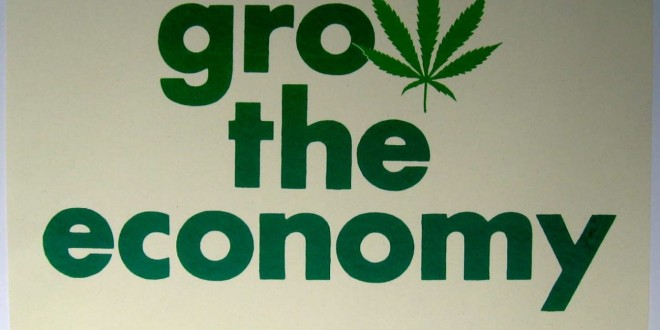Legal marijuana may be on its way to California, sooner rather than later.
 By the middle of July, seven groups had announced separate campaigns to legalize recreational use of cannabis statewide. Late in the month, that list grew to eight.
By the middle of July, seven groups had announced separate campaigns to legalize recreational use of cannabis statewide. Late in the month, that list grew to eight.
It’s unclear what the odds are on any of these efforts, but the newest entry is especially ambitious. The proposal, pushed by a Santa Rosa-based group called the Coalition for Cannabis Policy Reform, would regulate a legal recreational weed program.
The various groups hope to put their plans on the ballot in November 2016. That election, which will also include a presidential contest, is expected to draw large numbers of young voters, and they are more supportive of pot reform than any other age group.
Coalition for Cannabis Reform
Officials with the Coalition for Cannabis Reform announced in late July that they had hired several prominent Democratic political strategists. They said they would release a description of their plan and file a formal ballot proposal in a matter of weeks.
The Coalition is headed by lawyer Joe Rogoway. The proposal has a working title of ReformCA, and it’s backed by the California branch of NORML. Other big players in the marijuana world are expected to join the campaign.
ReformCA is widely believed to have the best odds of any proposal submitted so far. Eight ballot petitions makes for a chaotic field, but most of those plans will probably be abandoned over the next several months.
Hundreds of thousands of signatures needed
The critical factor for the groups behind these initiatives is cost. Only a realistic, well-crafted ballot proposal is likely to attract big-time funding, the millions of dollars needed to gather hundreds of thousands of signatures from across California.
Rogoway said his group would propose a “robust set of regulations” governing legal recreational marijuana. Those rules would allow adults to possess small amounts of the drug for personal use and would legalize a retail pot industry.
“We’re going to have strict licensing criteria, and we’re going to be able to generate hundreds of millions of dollars for the state based on the model we want to put in place,” he said.
Once a petition is filed, it must clear the state attorney general’s office. Once that happens, backers can start collecting the nearly 400,000 signatures necessary to put the question on the ballot.
The eight initiatives are supported by a wide range of cannabis advocates. Omar Figueroa, a lawyer based in Santa Rosa who defends clients charged with weed crimes, signed onto four of the proposals. The NAACP is behind another petition, and its president, Alice Huffman, is also working on ReformCA.
Overlapping interests
Those overlapping loyalties will likely make for a confusing few months for voters. But the competition and cooperation could ultimately make for a better, more winnable proposal.
The state charges only a $200 filing fee, so the initiative process is open to almost anyone. That fact is reflected in some of the cannabis proposals, which would set California possession limits unrealistically high.
 If more than one proposal winds up on the ballot, it could spell trouble for reform. David McCuan, a professor of political science at Sonoma State University, said California voters will likely see as many as 30 different initiatives on the ballot next year, and several could involve legalization. The competing choices could turn voters off, McCuan said.
If more than one proposal winds up on the ballot, it could spell trouble for reform. David McCuan, a professor of political science at Sonoma State University, said California voters will likely see as many as 30 different initiatives on the ballot next year, and several could involve legalization. The competing choices could turn voters off, McCuan said.
“When voters are faced with multiple choices, they generally vote no and maintain the status quo,” he said.
As of this summer, ReformCA had raised roughly $500,000 from supporters across the state. That puts the group’s campaign well ahead of the competition. Advocates with the group said they plan to raise about $4 million in coming months.
There are other heavy-hitters in the marijuana world that could launch ballot petitions for 2016. The Drug Policy Alliance and the Marijuana Policy Project have yet to back any of the proposals, and their support could make or break any initiative.
 California Marijuana Market Breaking "Marijuana News" from CA
California Marijuana Market Breaking "Marijuana News" from CA


